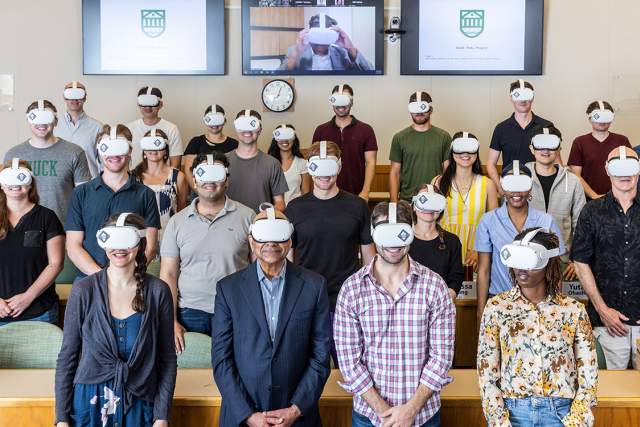As the 2022–2023 academic year officially gets underway, Tuck has announced two new exciting course types that will be added to its slate of elective offerings: Tuck Sprint Courses and Tuck Practicums.
Tuck Sprint Courses allow for exploration of a timely, emergent, or topical subject that is not currently covered in the Tuck curriculum, or for deeper dives into a focused area that expands on material covered at a higher level in an existing course. Sprint courses will entail 4.5 hours of instruction and may incorporate new forms of pedagogy. These courses will earn 0.5 credits and will be graded credit/fail.
Sprint Courses to be offered this academic year will tackle U.S.-China relations; managing business under sanctions; horizon scanning and the latest in foresight methods; mentorship at the intersection of race, gender, and nationality; and decision biases in the NBA. The courses will be taught by both Tuck and Dartmouth-affiliated faculty, including Tuck Clinical Professor Stacy Blake-Beard, Dartmouth Associate Professor of Government Jennifer Lind, Tuck Visiting Professor Andrew Vorkink, Tuck Clinical Professor Scott Anthony, and Tuck Associate Professor Dan Feiler.
Tuck Practicums are experiential courses emphasizing the application and expansion of knowledge acquired from other Tuck courses through hands-on, live project work with real organizations or assets. Practicums will earn 1.5 credits. There may be instances in which students have to apply for available seats in practicum courses. Practicums will be graded using the standard Tuck grading scheme.
There is one Tuck Practicum already underway this fall: the Early-Stage Venture Capital Workshop Practicum led by Jim Feuille D’79, adjunct professor and faculty adviser for the Center for Private Equity and Venture Capital. Other examples of potential future practicums include a private equity practicum and a diversity entrepreneurship practicum focused on partnering students with participants in Tuck’s Diversity Business executive education programs.
These innovations are yet another example of how Tuck faculty push the boundaries of knowledge creation and dissemination to keep our curriculum and our students at the forefront of business.
—Joe Hall
“These innovations are yet another example of how Tuck faculty push the boundaries of knowledge creation and dissemination to keep our curriculum and our students at the forefront of business,” says Senior Associate Dean for Teaching & Learning Joe Hall, the David T. McLaughlin D’54, T’55 Clinical Professor. “We look forward to the Tuck Sprint Courses and Practicums that are introduced in the terms ahead and to the Independent Study work that our students undertake.”
In July, Tuck also announced updated requirements for Independent Studies. Students leverage independent studies to customize their educational experience by conducting in-depth, independent research on a topic of their choice, from applications of blockchain to market sizing in reproductive health.
“In adopting these new course types and refining our Independent Studies, we wish to strike a balance between these courses and our other academic offerings,” says Hall. “Tuck’s small scale allows for this type of curricular flexibility and optionality for personalized academic exploration.”
Of the 39 elective credits required to graduate with a Tuck MBA, at least 31.5 credits must be earned from electives other than sprints, practicums, and Independent Studies. Further, in each term, students must earn 6 credits from courses other than Sprints, Practicums, and Independent Studies.

